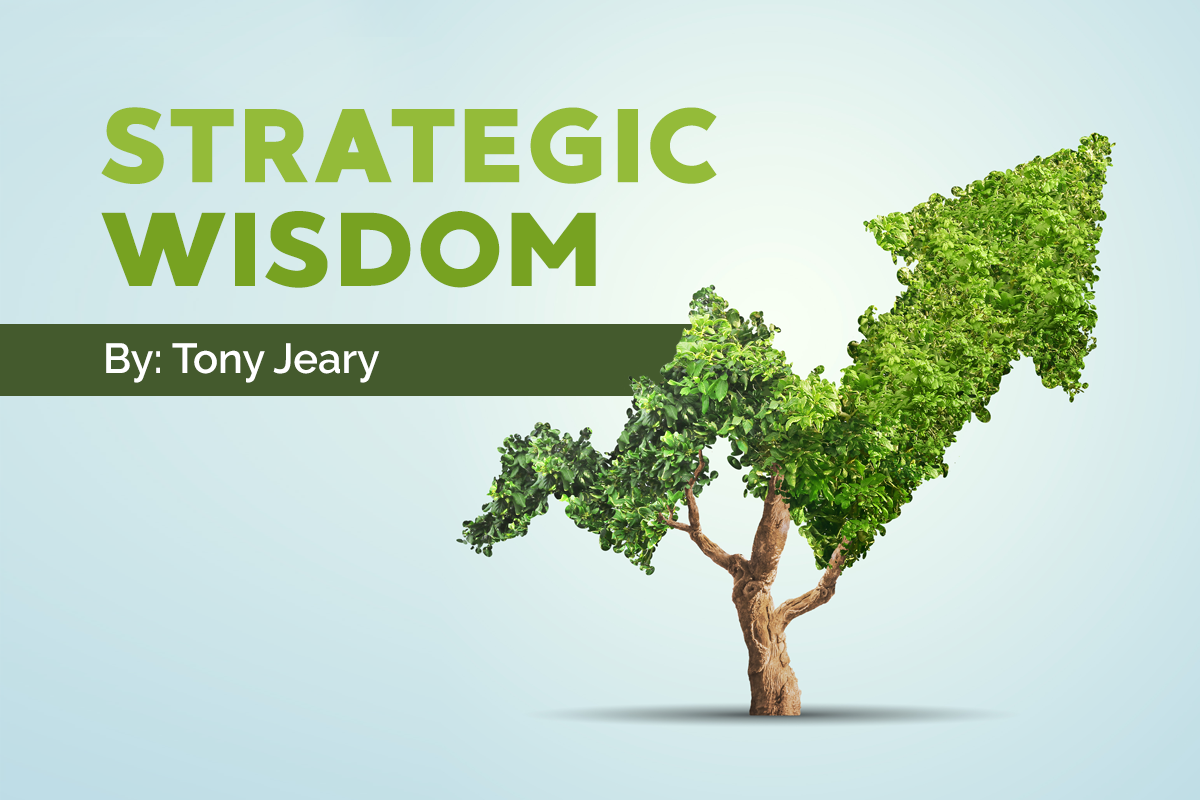
The difference between knowledge and wisdom?
Knowledge is knowing a tomato is a fruit.
Wisdom is not putting it in a fruit salad. —Peter Kay
Wisdom is something we all want more of. In fact, we can never have too much. I’ve invested the better part of my life seeking ways to be intentionally strategic about everything, in both my personal and professional life, and then teaching that wisdom to others who want to get supreme results in both areas.
Really, isn’t that what wisdom is—intentionally applying the knowledge we have to make smart, strategic judgments and decisions that will take us where we want to go? I call it being intentionally strategic, or strategic thinking.
Some call it acumen, or even astuteness or prudence. The Google Dictionary defines wisdom as “the quality of having experience, knowledge, and good judgment.”
Notice that it’s a combination of the three. Obviously, experience alone—good or bad—doesn’t make you wise, any more than knowledge alone does. I believe wisdom is a powerful blending of the two with intentionally strategic judgment to know where, why, how, and in what ways to apply them to get the best results.
Defining Wisdom
Wisdom is all about thinking. As Jim Norman, my late friend who was also my coach and company president for twenty years, said, “Thinking is hard.” While our thinking is certainly limited by things like our vocabulary, our education, our experiences, and even our focus, I believe the kind of thinking he was talking about was more aligned with wisdom.
It’s the kind of thinking that is not automatic. It’s reflective. It separates and culls the valuable nuggets from the mundane thoughts. It seeks to understand and aptly judge. It rises above the limitations of knowledge and intellect.
Jim was one of the wisest and most strategic thinkers I’ve ever known. Before he passed away a few years ago, we had started writing together a book entitled Thinking: Change Your Thinking, Change Your Results.
Here’s a snippet Jim wrote in the first chapter of that book (which is as far as we got) that I believe illustrates our point that wisdom is all about thinking:
Is there a common element to all problems, regardless of the nature of the problem? I believe there is, and the common element is thinking!
Every new project, strategy, or activity first appeared in someone’s mind as an idea. That means thought is the most basic element in creating, planning, and executing any strategy. It also means that errors in thinking are the root cause of a failed or disappointing strategy. So thinking is the common element for analyzing poor results.
Based on that concept, flawed thinking becomes the real problem. To correct any failure, the process requires identification of the flawed thinking and some analysis as to why the thinking was flawed.
What was believed to be true that wasn’t true? That question will always reveal that something believed to be true was not true, and that’s the reason the strategy failed.”
Can you see the correlation between strategic thinking and wisdom? In essence, wisdom is thinking at its best, or basically “flawless thinking.” So how do we arrive at such a stage? Let’s look at a powerful concept I teach called the Belief Window.
Our Belief Window
We all have principles and truisms on our Belief Window through which we filter life and process information.
We begin forming the truisms or principles on our Believe Window right after birth, and we add to it based on the people we build our lives around as we get older. They affect everything we see, hear, and experience, and consequently, they affect the choices we make.
Unless you’re operating your life with flawless principles, you’re probably not operating at the level of wisdom you could and, as a result, you’re not achieving the level of success you could. — Click to Tweet
Uncovering the Blind Spots that reveal the flawed principles on your Belief Window can often catapult you toward quickening your achievement!
Faulty Principles = Faulty Results
Accurate Principles = Wisdom …
… which leads to better results.
Perspective
Another quality a wise person possesses is the ability to put things in perspective. Or better yet, the ability to rise above a preconceived perspective by reflecting on the knowledge, intelligence, and experiences available to them.
Ken Poirot, bestselling author of Mentor Me, puts this twist on it:
Wisdom comes from making mistakes, having the courage to face them, and making adjustments moving forward based upon the knowledge acquired through those experiences.
If you’re looking for better results in your life, maybe it’s time to take stock of the experiences and knowledge you’ve gained, reflect deeply on the mistakes you’ve made, make intentionally strategic adjustments, and move forward in wisdom.
Wisdom is Wealth
As you probably know, I’m all about helping people think at a deeper level. That’s my gift. So I’m asking you to think deeply for a moment.
How focused and determined are you to acquire wisdom? Remember that seeking smart advice is one of the best ways to do that. How much are you investing in being coached and/or mentored? How about training? Are you gaining wisdom from others through blogs, podcasts, videos, apps, etc.? The lists of available resources for acquiring wisdom is endless.
I hope this blog post has inspired you. I hope it helps you, both now and in the future, be more intentionally strategic in growing your wisdom, accumulating it, bringing it into your team, and applying it so you get extraordinary results in every area of your life.
STRATEGIC FACILITATION • RESULTS COACHING • KEYNOTE EXPERIENCES